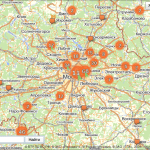Solving problems at the local level, the kind encountered by inhabitants of big cities and regional centers, is becoming more and more feasible thanks to projects based on crowdsourcing technology. Crowdsourcing is getting groups of people involved in the discussion and resolution of all sorts of different problems, ranging from firefighting to election-monitoring.

Map of Moscow and the Moscow Region
In theory, there are already various government agencies and institutions working to manage local life so that citizens can live in comfort and security. But in practice the results are not always satisfactory: the illegal cutting down of trees, broken lifts, and burnt-out light streetlights are still problems people encounter on a daily basis. To solve these and similar problems “clouds” have been created — virtual projects, in which anyone with an Internet connection and a desire to improve things can take part.
StreetJournal.org [ru] is a project launched in the city of Perm, now operating in several major cities across Russia. The site has publicized nearly 8,000 problems, of which more than a third have been resolved. In addition to ordinary citizens, the platform is also being using by local authorities, who can use it to monitor the work of their contractors and to react to serious reports efficiently and directly.
The third group of people using the platform are nonprofit organizations, which can get access to up-to-date information and use it to monitor a situation and direct volunteers towards solving it.
ДайСигнал [DaiSignal] [ru] is an alternative project concerned with the eternal problems of roads and urban infrastructure and services. The portal receives information from more than 220 cities and towns.
The problem-solving process becomes itself the biggest problem.
In a majority of our encounters with life's daily problems (which we are individually incapable of fixing ourselves), the “problem-solving process becomes itself the biggest problem.” While the complaints submitted to DaiSignal are from individuals without any connection to one another (and are resolved privately, as well), the platform is a tool that allows people to view a situation holistically.
In cases where the number of reports in a given region is “off the scale,” one can conclude that specific services there are ineffective, and take the necessary measures, not by informing the authorities but instead informing those competent to fix things.
How effective such a system can be is demonstrated by the British analog FixMyStreet, which has accumulated more than 1,600 reports a week, including photographic and video evidence, of overflowing trash-bins, broken footpaths, and illegal graffiti.
Original [ru]








7 comments
Great article. Good to know that crowdsourcing is really helpful for urban based peoples which they are facing so much distracting situations. Good job, keep it up!
I realise the number comes from the original article, but just to note that the 1600 reports on FixMyStreet are *per week*, not ever. There have been over 200,000 reports since the service launched.
Thanks Tony. I’ve fixed the article to make that clear.